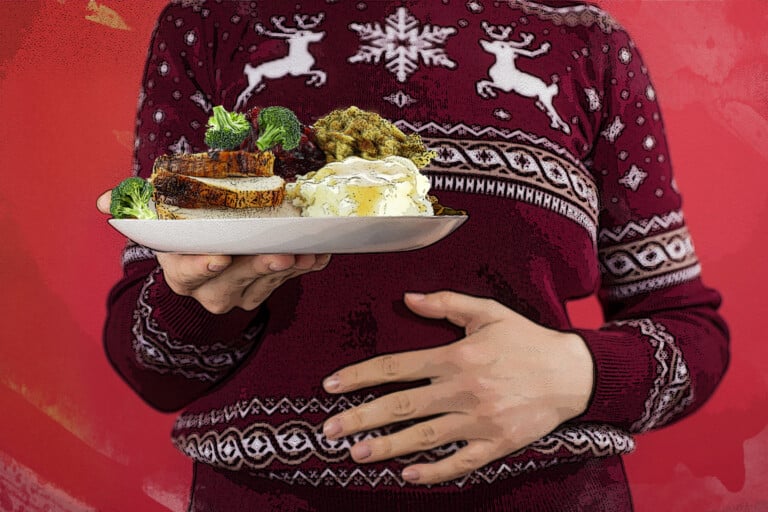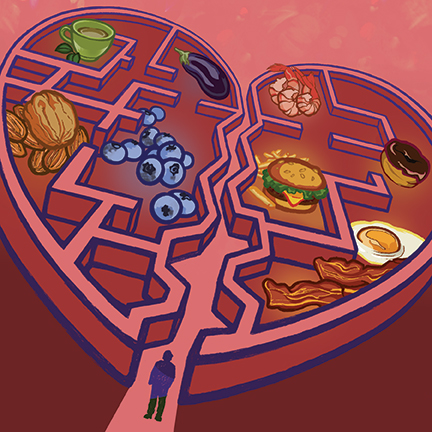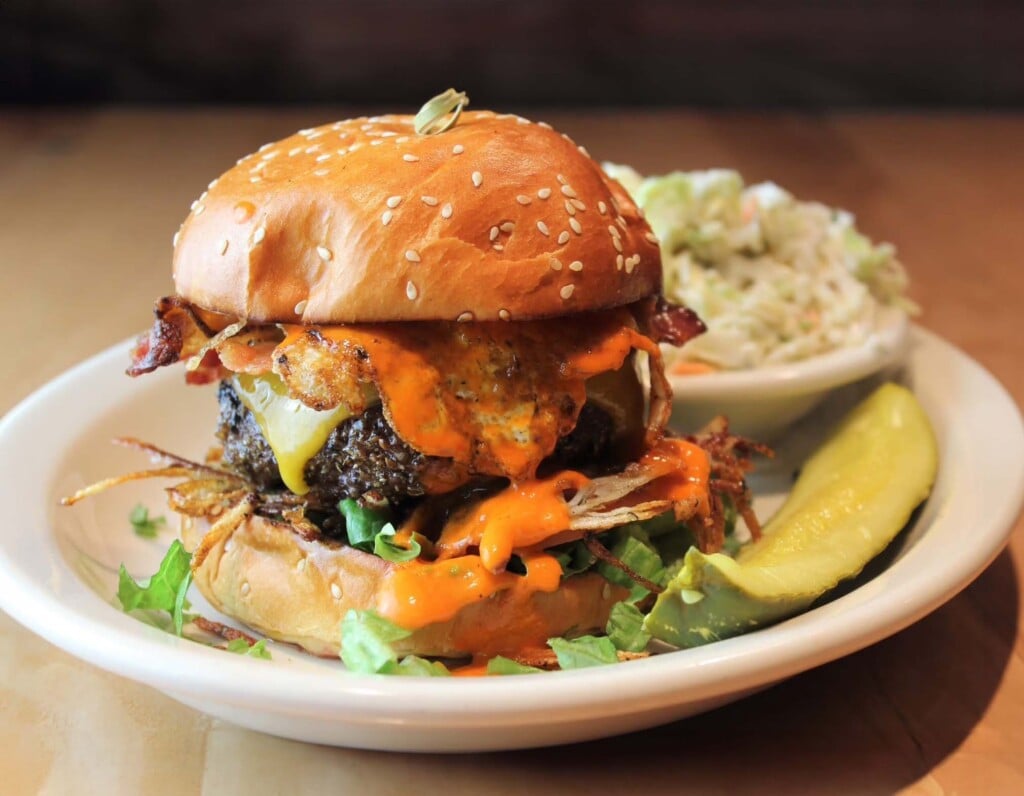Health: Too Much Imbibing
From feast to flare-up: How to keep holiday eating in check

Holiday eating sneaks up on you. You start by dipping into the Halloween candy bowl before cruising on to Thanksgiving leftovers and sugar cookies. By the time you ring in New Year, you may feel bloated, sluggish and a little bit sick. If you’ve been indulging in treats you don’t normally eat, you might wonder: Is this just stomach upset, or is it something more serious?
Dr. Dan Waszkowski, a family practice physician at DMC Primary Care in Raymond, says stomach-related complaints consistently rank among the top five symptoms he sees in his office. While much of the time it’s not a cause for concern, you should pay attention if your tummy troubles continue.
It’s normal to occasionally feel a burning sensation in your chest or throat after consuming a big meal, spicy food or alcohol. Even stress can trigger heartburn. But Waszkowski cautions that experiencing these symptoms more than twice a week for several consecutive weeks could war-
rant a visit to your health care provider.
“Any food that is fatty or rich, carbonated beverages or alcohol can trigger our stomach to produce more acid,” he says. “They can relax the esophageal sphincter, or the door that basically closes between the stomach and the esophagus. If that door isn’t closing completely, you can feel symptoms of reflux.”
Heartburn can feel like burning in the upper part of your abdomen, and you may also feel pressure or nausea. Occasionally taking over-the-counter antacids like Tums or Pepcid can calm irritation in the short-term, but chronic heartburn may require prescription-strength medication and other lifestyle changes.
“Heartburn becomes concerning when it’s persistent, requires regular medication, or comes with red flags,” Waszkowski says.
Some warning signs include:
• Difficulty or painful swallowing
• Unexplained weight loss
• Persistent vomiting or vomiting blood
• A chronic cough, hoarseness, or sore throat (especially if worse at night), or
• Unexplained chest pain
If you’re experiencing these symptoms, it’s important to get seen by a medical provider.
Food Poisoning vs. Stomach Flu
Have you enjoyed a delicious meal at a party only to find yourself in the bathroom later that night? Seasonal gatherings can also introduce other stomach hazards, including diarrhea or vomiting. Sometimes, it’s a one-off reaction to something you ate. Othertimes, a foodborne illness is the culprit.
Waszkowski says it’s important to understand the difference between food poisoning and a viral stomach bug. Food poisoning typically strikes quickly — within one to six hours after eating — and often affects multiple people who’ve all sampled the same food. Viral stomach bugs, like norovirus, are passed from person to person, and symptoms can last longer.
“There are a couple of things I tell people around Thanksgiving, and that’s to make sure you cook your turkey enough and to make sure that any surfaces that the turkey has touched are well-cleaned before you do any more food prep in that area,” he says.
It’s important to pay attention to cooked food, too. While it’s convenient to leave the food buffet out for friends and family who might stop by later, you shouldn’t leave your food out for more than two hours.
“The longer it sits out, the more likely bacteria or spores could grow, and you could end up with food poisoning,” Waszkowski says.
If diarrhea or vomiting lasts more than 72 hours, you may have picked up a virus rather than food poisoning. Call your provider if you can’t stay hydrated, or you notice blood in your stool or are spiking a high fever.
Is it Dangerous to Overeat?
When you eat a large meal, your stomach expands and produces extra acid, leading to bloating, nausea and discomfort. Sugary desserts can further spike your blood sugar, adding to feelings of sluggishness.
“Large meals also slow gastric emptying, so food sits longer in your stomach,” Waszkowski says. “That can intensify irritation and make reflux symptoms worse.”
For most, eating a large meal occasionally won’t negatively affect their health over the long-term. However, continually bombarding your system with sugar is not a good habit to practice.
“It leads to compounding issues, obesity being one of the biggest ones,” he says. “It can also lead to heart and vascular diseases, and it’s not good for your brain. But for the most part, our bodies can tolerate and reduce that load.”
For people with chronic conditions such as diabetes, heart disease or congestive heart failure, the risks of overconsuming fat, sugar and salt are higher. High-sodium holiday foods, for example, can cause fluid retention and worsen heart symptoms.
“Even your turkey meat is infused with salt,” Waszkowski says. “But if you try to eat well-balanced meals and smaller portions, you’re going to be fine.”
Dr. Dan’s Holiday Eating Tips
Although holiday gatherings often center around food, you can do things to minimize stomach upset without limiting fun with family and friends. Instead, you can:
• Start with smaller portions — divide your plate into four quadrants. Waszkowski suggests taking a little bit of stuffing, a portion of turkey, and choosing two vegetables to start.
• Go back for seconds if you’re still hungry and resist piling everything on your plate at once.
• Don’t feel obligated to “clean your plate.”
• Limit alcohol and carbonated beverages, which can increase bloating and reflux.
• Add fiber-rich foods, when possible, to aid digestion.
While it may feel tempting to zonk out on the coach and watch football immediately after you’ve finished chowing down, Dr. Waszkowski suggests doing the opposite.
“It’s better to go for a short walk because that gets things moving in your system,”
he says.
Dr. Dan Waszkowski recently moved his family practice from DMC Primary Care’s Londonderry office, where he served patients for 18 years, to DMC Primary Care’s Raymond office. He treats patients of all ages — his youngest patients are newborns, and his oldest patient is 104 years old. He is particularly interested in treating families, men’s issues and taking a lifestyle approach to treating patients.













